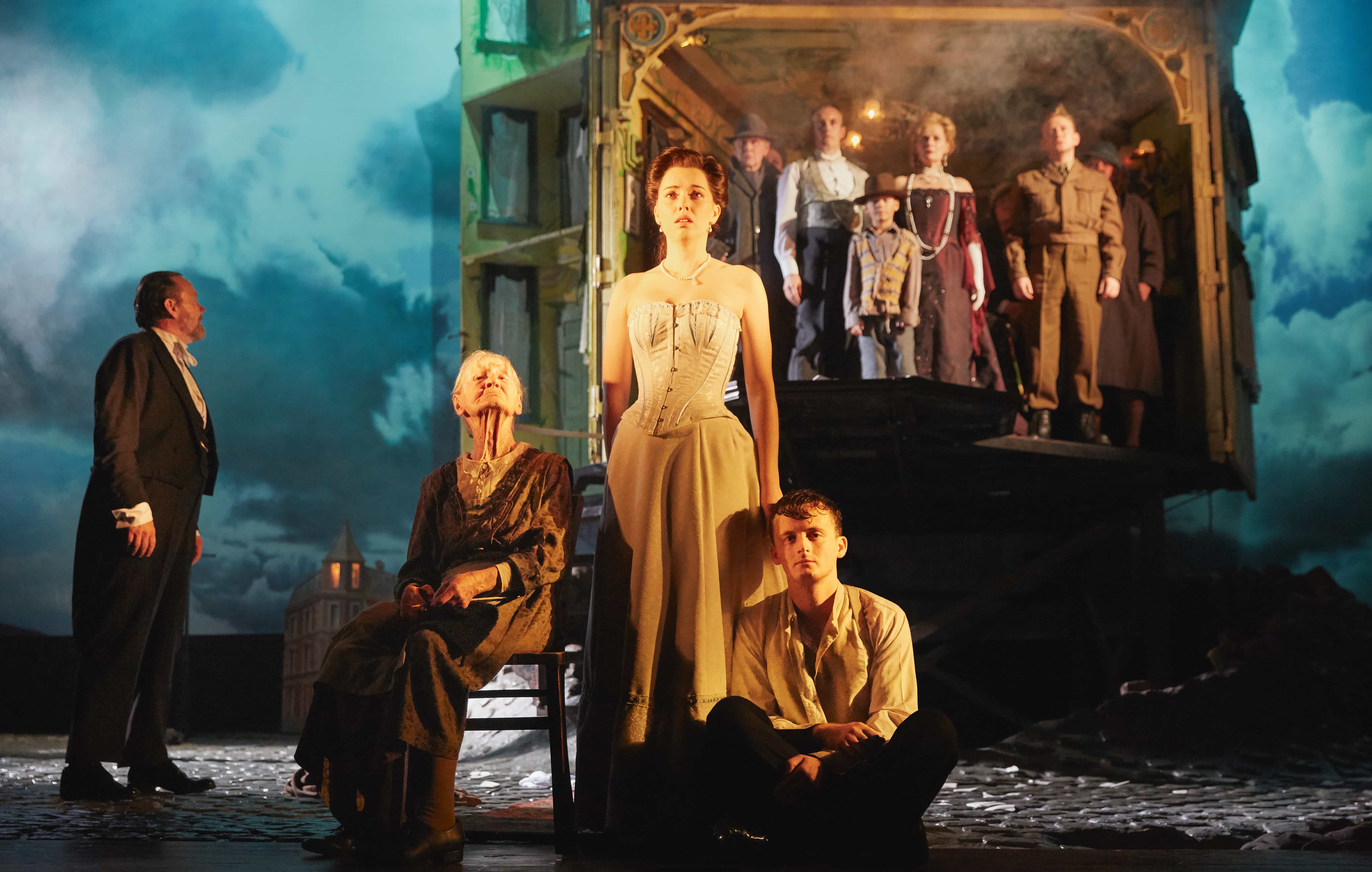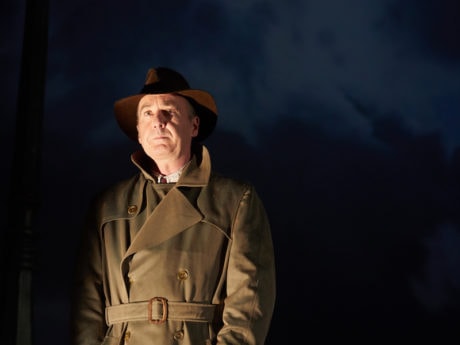J.B. Priestley’s An Inspector Calls, as directed by Stephen Daldry, represents the best of international theatre. The play combines the chocolate-box delights of an Agatha Christie mystery with deeper undertones of morality and a tinge of the supernatural. Daldry’s justly famous version—first produced in the 1990s—is expressionistic in style, and equally relevant 25 years later.

The much-admired thriller has won multiple Tony, Olivier, and Drama Desk Awards. It takes place in three different segments of time: 1912, 1945, and 2018. Daldry (Billy Elliot, The Crown) kicks off a four-city tour with this engagement at the Shakespeare Theatre Company. Initially framed as a response to Thatcherism, the Daldry production, now a classic, has resonances in the wake of many contemporary crises, from 9/11 to Brexit to the election of Donald Trump.
At the outset, it is 1912, roughly a week before the sinking of the Titanic. We see a sumptuous suburban house perched perilously on a wasteland reminiscent of the Blitz. It is a propitious occasion at the home of Mr. Birling (Jeff Harmer), a wealthy industrialist, and former Lord Mayor and his upper-class wife, Mrs. Birling (Christine Kavanagh). The daughter, Sheila (Lianne Harvey), is engaged to Gerald Croft (Andrew Macklin), a business competitor.
Mr. Birling, as well as his avatar Gerald, views the alliance as a successful merger. Sheila can look forward to being financially secure and (presumably) loved, but also exiled to the drawing room during serious discussions, and unable to vote. Sheila has a brother, Eric (Hamish Riddle), who has a drinking problem and some secrets of his own in a family which is riddled with them. The shadow of the coming war is present throughout.
We sense already that this is not a “realistic” play. The house is a kind of doll’s house. Fog, rain and Hitchcockian music envelop the scene. A local boy, circa 1945, opens the curtain. He is later handed an orange by Inspector Goole (Liam Brennan), the “Inspector” of the title.
The paterfamilias, as portrayed by Jeff Harmer, is a self-made man for whom power is a religion. He is the kind of man who believes he knows something about everything, but who in reality knows nothing about anything. Christine Kavanagh’s Mrs. Birling slightly patronizes her nouveau-riche spouse. Both are sorely tested as a result of the evening’s events. Their performances are imaginative and rich in detail.
Lianne Harvey as Sheila endures a series of shocks as do her parents but proves to be less naïve than she seems. Harvey handles Sheila’s transition admirably. From a slightly giddy socialite, Sheila turns into a reasonably adult woman, capable of empathy and able to make difficult choices. Riddle as brother Eric brings us the gradual breakdown of a well-meaning but weak individual with passionate conviction. Andrew Macklin (Gerald) subtly highlights the limitations of his character as his engagement to Sheila comes under increasing strain.
The play is designed as a series of investigations, and its central focus is the suicide of one Eva Smith, a working-class young woman who was once employed by Mr. Birling at his factory before she was fired as one of the ringleaders of an unsuccessful strike. Priestley had observed and recorded the tribulations of just such people in his 1934 travelogue, English Journey. The girls who worked in the mills suffered from long hours and low pay.
The Inspector has many questions for the Birlings. He is compassionate, but sharply intelligent. He refuses to accept Mr. Birling’s assertion that “we are all respectable” and therefore could have had nothing to do with the death. He shows the photograph of Eva to some of the family members. He reads a portion of her diary. It is increasingly clear that for him, each family member bears some part of the guilt.

Brennan has just the right tone of mysterious authority to compel our attention. He sees through the Birlings from the beginning, but he is not so much judgmental as determined to uncover their flaws and failures. The Inspector’s philosophy is directly in opposition to Mr. Birling’s credo of every man for himself. The suspense continues to grow as the role of each character in the suicide is revealed.
Diana Payne-Myers, as the servant Edna, performs well in a key role as the representative of the servant class. She brings out a rug and a special chair for Mrs. Burling, and at other times she raptly observes the scene before her. The Ensemble, made up of Adam Collier, Chloe Orrock, Beth Tuckey, and Chris Barritt, adds immeasurably to the poignancy and depth of the presentation.
The visual and aural splendor of this Inspector has rightly been hailed as astonishing. Scenic and Costume Designer Ian MacNeil, Lighting Designer Rick Fisher, Composer Stephen Warbeck, and Sound Designer Sebastian Frost are the creative talents responsible for this banquet of the senses.
As another kind of inspection looms in DC, there is no better time to see this production. Uncertainty and chaos seem prominent in our world. But J.B. Priestley, who lost most of his friends in the first World War, reminds us of the enduring power of optimism. Perhaps his reassuring words, like An Inspector Calls, can provide inspiration all these decades later. In Letters to a Returning Serviceman, published in 1945, he wrote:
My dear Robert,
…I want you to remember that I was once a returning serviceman too. ..I spent nearly five years in the infantry, was three times a casualty, and saw the flower of my generation mown down among the barbed wire….Remember that we are never so lonely, so detached, so separate, as we imagine ourselves to be, and cannot escape, even if we go and bleed to death trying to escape, being members of the great human family…
You, I know, love life, and have fought hard for it—so now, my dear Robert, come out and live it, and keep on fighting for it.
Listen—there goes the last high trembling note of the Last Post—and now, listen again, here comes the Reveille.
Yours ever,
J.B.P.
Other Cast Members
Younger Boy (alternating) David G. Curry III, Michael Neyland
Girl (alternating) Elle Vanzego, Sophie Wood
Older Boy (alternating) Holden DuBois, Aksel Moeller
Supernumeraries: Craig Allen, Madalaina D’Angelo, Acacia Danielson, Richard Fiske, William Goblirsch, Rosemary Regan
[Read John Stoltenberg’s Magic Time column about An Inspector Calls.]
Running Time: About one hour and 45 minutes, with no intermission.
An Inspector Calls plays through December 23, 2018, at the Shakespeare Theatre Company, performing at Sidney Harman Hall, 610 F Street NW, Washington, DC. For tickets, call the box office at (202) 547-1122, or go online.




